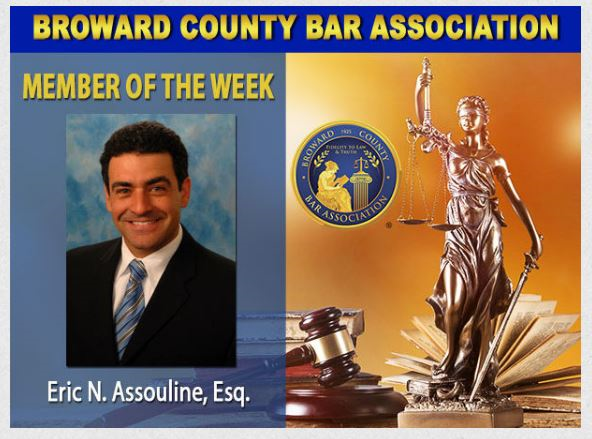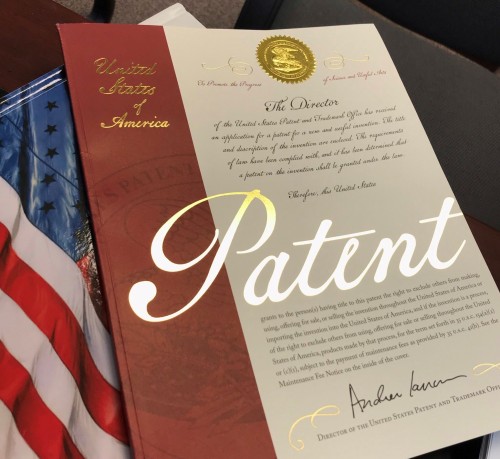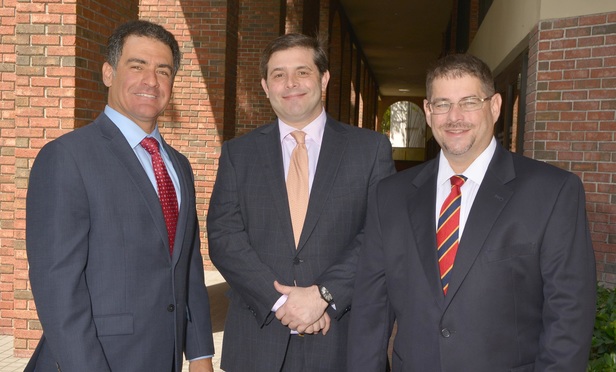
The Broward County Bar Association Featured Assouline & Berlowe Litigation Partner as the “Member of the Week”.
Eric N. Assouline, is a co-founder of Assouline & Berlowe, P.A., a business litigation and transactional boutique law firm. Eric credits his personal and professional success to hard work, a strong work ethic inspired by his parents, and good Jewish values.
Eric is a first-generation American. Eric was raised in Queens, New York, by immigrant French Moroccan parents, with few resources.
Started in 2003, Assouline & Berlowe’s main practice areas are patent and intellectual property law; commercial litigation and appeals; real estate; labor and employment; international law and arbitration; creditors’ rights and bankruptcy; and as of 2018 the law firm added an additional practice area – Trust, Estates, and Guardianship. The firm has three South Florida offices, and has served as counsel of record on many complex cases outside of Florida.
Eric N. Assouline is a litigation partner in the Miami and Ft. Lauderdale offices, and the head of the business litigation practice group. Eric’s practice focuses on complex business litigation, intellectual property and real estate litigation, bankruptcy and creditors’ rights. Eric enjoys a complicated business litigation dispute, analyzing the risks and benefits of the strategy to employ, and then implementing the plan. Eric takes pride in taking a case from inception to conclusion for the client, which often includes trips into the appellate and bankruptcy courts.
As the business world continues its international expansion, Assouline & Berlowe guides its clients through their legal challenges. As a French speaking attorney, Eric has been hired by many clients from France and they are always shocked at the expense involved in litigating a case in the United States. Eric does his best to bridge his clients between differing legal environments. With the assistance of his partner, Daniel Vielleville, who was an attorney in Venezuela before becoming an attorney in the United States, they bridge the gap with the firm’s Latin American clientele. Corporate Partner Carl Perdue plays a similar role with corporate matters from his extensive experience with complex Middle East corporate finance.
Assouline & Berlowe’s management predicts growth in the areas of technology, real estate, intellectual property, and trust and estate issues. “We’re more than just another boutique law firm. We take great pride in the high quality legal work that we do every day. I believe our extensive network of attorneys that refer their clients to our firm, including many referrals from former opposing counsel, is a testament to how we honor our craft,” Eric Assouline has been quoted as saying.
In the Beginning
Eric Assouline and Peter Berlowe first served together as members of the University of Miami Law Review.
After law school, they worked together in the Miami office of Weil, Gotshal & Manges, LLP, where they trained as litigators on nationally recognized cases. While there, Eric Assouline served as the court appointed receiver’s lead litigation attorney charged with recovery actions in a high-profile global Ponzi scheme.
When Assouline & Berlowe first opened its doors 0n February 10, 2003, in Coral Gables, its office was sublet from Peter Berlowe’s father. Eric has been quoted as saying “Our first office had thick shag carpet, old fashioned wood paneling, and had not been renovated in decades. The furnishings were comprised of mis-matched furniture and left over construction materials that we used to build a new countertop for the receptionist area,” From those humble beginnings, Assouline & Berlowe expanded with an office in Broward in July 2004, and later another office in Boca Raton in 2008.
As part of its flagship intellectual property practice, the firm has two registered patent attorneys, including Peter Koziol, who is the head of the IP Litigation Group and Greg Popowitz, who has been with the firm for over 5 years.
Ellen Leibovitch, who is board certified in the areas of labor and employment, heads the firm’s Boca Raton office.
Eric Assouline has been quoted as saying that “Through our 10 attorneys we now have several hundred years of collective business law experience, much of it gained in practice at large, prestigious law firms.”
Eric Assouline has also been quoted as saying: “As the managing partner of the firm, I need to know what everyone is doing. I have an ethical obligation to protect all of the firm’s clients and to be there to pick up the pieces if anything were to happen to any particular attorney at the firm. But I do not tell attorneys how to do their job. The attorneys at my firm are exceptionally qualified and know their craft. My job is to make it as easy as possible for them to get their work done and keep the firm’s clients satisfied.”
Eric Assouline believes that his firm has the talent and experience to compete with any firm in the area of business law. “As it relates to regional boutique business firms, because we are smaller, we can offer more flexibility without compromising on service.” Eric stresses the fact that clients regularly interact with the firm’s attorneys through multi-office video conferencing. “This not only gives us what I believe is a significant competitive edge, but it helps keep clients in close contact, which is important to our client relationships.”
Giving Back
As individual professionals and as a firm, the attorneys of Assouline & Berlowe believe in sharing and they have backed that belief from the beginning. “We’ve long been involved in giving back to the community, in time, money and energy, to support numerous worthy causes and those who are less fortunate,” Eric Assouline has been quoted as saying.
Just some examples include: a mayoral debate for Miami-Dade County; a fundraising program for the Cystic Fibrosis Foundation; and a charity golf tournament in Boca Raton and a Walk-a-Thon in Sunrise, both in support of the Juvenile Diabetes Research Foundation. “In 2008, as the economy struggled, we did not feel it was appropriate to have a year-end holiday staff party. So, instead we made donations to the Joe DiMaggio Children’s Hospital in Hollywood and to the Miami Children’s Hospital,” Eric Assouline has been quoted as saying.
Eric Assouline currently serves on the board of directors of: the B’nai Brith Justice Unit; the Jewish National Fund; Hillel of Broward and Palm Beach Counties; the University of Miami Law Alumni Association; and the Florida Alumni of Arizona State University.
Eric Assouline has been a regular guest speaker at St. Thomas University School of Law, where his wife, Iris Rogatinsky, is a law professor. During his talks, Eric Assouline has mentored law students seeking his advice and insight on the practice of law, and he has conducted lectures on litigation and deposition skills for Pincus Professional Education. He also regularly volunteers to judge law school moot court and mock trial competitions at the University of Miami and Nova Southeastern Law School.
“I feel fortunate that I have been given this opportunity and I do my best to instill the same strong work ethic and uncompromising moral values upon my children with the help of my amazing wife.” She also worked with both Eric Assouilne him Peter Berlowe at Weil Gotshal & Manges.
Eric Assouline’s rise from humble beginnings to prominence in the legal community has colored his view of the world, the community, and his firm. Eric Assouline and the attorneys of Assouline & Berlowe recognize their fortuity. Eric Assouline has been quoted as saying: “You will not hear me complain about my life. I find it very unbecoming to complain about trivial matters. No one is perfect and no situation is perfect forever. I like to say that I don’t look at the glass half full. I am grateful I even have a glass to drink. And as far as I am concerned, my glass always runneth over.”
Eric N. Assouline, Esq.
Business Litigation Partner
ASSOULINE & BERLOWE, P.A.
Miami Tower
100 SE 2nd St., Suite 3105
Miami, FL 33131
Telephone: 305-567-5576
Email: ena@assoulineberlowe.com
www.assoulineberlowe.com
Intellectual Property, Labor & Employment Law, Real Estate, International Dispute Resolution, Commercial Litigation, Corporate Law, and Bankruptcy
Miami · Ft. Lauderdale · Boca Raton















